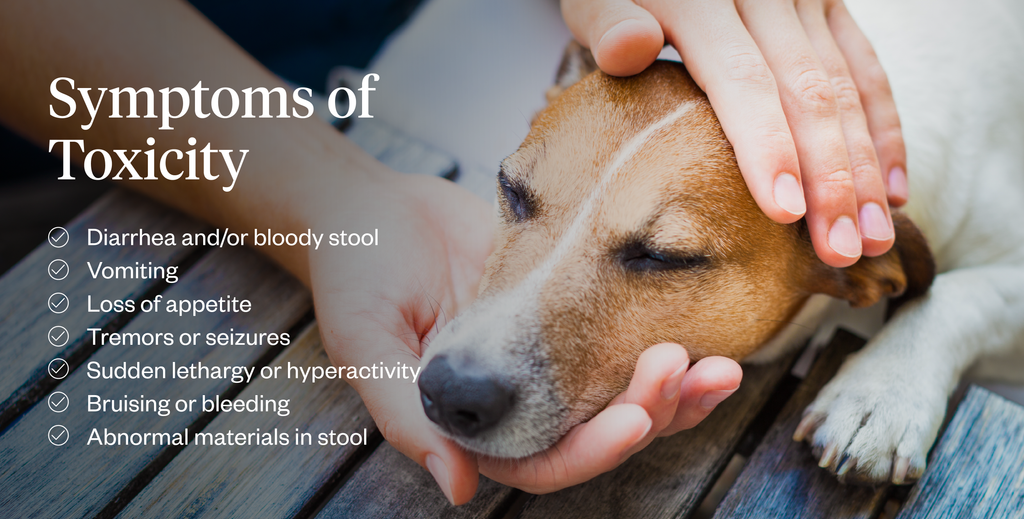7 Min Read
What Medications Are Toxic to Dogs?
Key takeaway

Why pet owners are switching to online vet care with Dutch
-
Prescriptions delivered free to you
-
Fast access to Licensed Vets over video
-
Unlimited video visits and follow-ups
It’s difficult to see our pets in pain or discomfort. However, it’s important to remember that many human medications can be harmful to your dog, so it’s always best to seek veterinary advice if your dog is ill in some way. Sometimes, human medications can work for our canine friends (like Benadryl for anxiety or mild allergic reactions), but usually there are better, pet-safe alternatives.
Although certain human medicines can work well for dogs, usually the dose needs to be adjusted. Dogs metabolize substances differently than we do, so it is not recommended to give your dog any type of medication unless it has been prescribed by a licensed vet.
In this post we’ll focus on toxic medications, specifically, but you can read more about common dog poisons on our blog. While not all human medications are unsafe for dogs, it’s a good idea to seek veterinary attention if your dog ingests any of your meds.¹
- Symptoms of Toxicity
- 10 Common Human Medications That Are Toxic to Dogs
- What to do if Your Dog Ingests Human Medication
- Final Notes
Symptoms of Toxicity
Even the most well-trained dogs sometimes get into things they shouldn’t. Puppies and young dogs are prone to chewing and biting on things, which can lead to accidental ingestion of toxic substances. Some dogs cuddle up to sleep in their owner’s bed at night, giving them free access to medicine that might be sitting on the bedside table. And bored dogs may also go looking for something to stick their nose into, and human medications can smell intriguing.²

Given the vast amount of human medications and dosages available, dogs can suffer a myriad of symptoms if they consume certain types. These symptoms can range from very mild to life-threatening, depending on how much and what type of drug was ingested. A dog’s size and medical history are also highly relevant in these situations. Here are some general signs of canine poisoning to look out for³:
- Diarrhea and/or bloody stool
- Vomiting
- Loss of appetite
- Tremors or seizures
- Sudden lethargy or hyperactivity
- Bruising or bleeding
- Abnormal materials in stool
The above symptoms usually appear within a short amount of time after consumption of a toxic substance, but there are also long-term health implications, such as³:
- Organ damage (like kidney or liver failure)
- Cardiac problems (like arrhythmia)
- Chronic ulcers or other gastrointestinal issues
- Anemia (low iron and lack of hemoglobin or red blood cells)⁴
10 Common Human Medications That Are Toxic to Dogs
Now, let’s dive into the dangers of specific types of medications. These are the 10 most common human meds that can be harmful for dogs²:
- Aspirin
- Ibuprofen
- Naproxen
- Indomethacin
- Acetaminophen
- Xanax
- Ambien
- ACE inhibitors
- Beta Blockers
- Adderall
NSAIDs:
Ibuprofen, Naproxen, Indomethacin, and Aspirin all fall under the category of nonsteroidal anti-inflammatory drugs or NSAIDs. These are common, over-the-counter medications used for mild pain relief. There are no human over-the-counter NSAIDs that are safe to give to pets. Vets may actually prescribe pet specific NSAIDs to treat your dog’s ailment. Such medications should be given sparingly, because they can cause potentially serious side effects. Long-term use of NSAIDs can cause kidney dysfunction, clotting problems, and liver disease.
One reason your dog might be prescribed an NSAID is if they suffer from osteoarthritis, which leads to wear and tear on the cartilage over time. Eventually, this causes bones to rub together painfully in certain areas. NSAIDs can be effective in managing this type of pain in dogs. NSAID medications are also used to manage pain in dogs after surgery.⁵
Acetaminophen/Tylenol
Another common pain reliever is acetaminophen (sold under the brand name, Tylenol in the United States). Vets will sometimes administer this medication to dogs. However, it’s important to note that acetaminophen can easily lead to toxicity in dogs, so always speak to a vet first. Acetaminophen poisoning can occur from even just a single exposure to a large dose or from a low dose over an extended period of time.² Signs of toxicity include:
- Stomach upset
- Lethargy
- Loss of appetite
- Jaundice (yellow pigmentation on the skin and eyes that indicates possible liver damage)
It’s advisable to keep acetaminophen well away from your furry friend.
Other medications
Various other medications can also be harmful to your dog, such as those used to treat/manage ADHD, blood pressure, anxiety, and sleep problems. The latter can cause dangerously slow breathing or severe agitation, while blood pressure medicines can result in your dog’s blood pressure becoming too low. Ingestion of ADHD medication may cause tremors, life-threatening seizures, or cardiac/respiratory arrest.²
What to do if Your Dog Ingests Human Medication
The best way to prevent your dog from getting poisoned by human medicine is to keep it out of reach. Storing pill bottles in a bathroom cabinet or on a high shelf makes it less likely that your pup will poke their nose in it. But what do you do if your furry friend does swallow some of your medication accidentally?
Most accidental poisonings can be easily treated with early intervention. Seek emergency veterinary help as soon as you realize that your dog has consumed toxic medication. Often, the first step is to induce vomiting, because it’s a quick way of getting a dog to expel any toxins in their system. Your vet may also use an IV fluid drip or other medications to combat the toxicity.²
You can also call the ASPCA pet poison control hotline if your dog has ingested a harmful substance. Keep this number in a permanent spot in your home in case of an emergency: (888) 426-4435.

Final Notes
Many human meds aren’t suitable for animals and can easily cause toxicity in dogs. Symptoms will vary depending on the type of medicine, the size of the dog, and the dosage consumed. If you think your dog might have eaten something poisonous, seek emergency vet care immediately. The earlier the medical intervention occurs, the better. If your dog shows no signs of poisoning, but you suspect they may have ingested something dangerous, it’s best to check with a vet.
Having a reliable vet whom you get along with is important for both you and your dog. Dutch makes it easy to find the right vet and receive the best care possible. Use our televet services to get answers to all your questions — whether it’s a concern about your dog’s behavior or an illness — Dutch vets have you covered.
Share
References
-
Khan, Safdar A. “Poisonings from Human Prescription Drugs - Special Pet Topics.” Merck Veterinary Manual, Merck & Co., Inc., Nov. 2022, www.merckvetmanual.com/special-pet-topics/poisoning/poisonings-from-human-prescription-drugs.
-
Fitzgerald, Kevin. “My Dog Ate My Pills! 10 Most Dangerous Human Medications for Pets.” American Kennel Club (AKC), 30 June 2023, www.akc.org/expert-advice/health/the-10-human-medications-most-dangerous-to-dogs/.
-
Gibeault, Stephanie. “The Common Signs and Symptoms of Poisoning in Dogs.” American Kennel Club (AKC), 25 Feb. 2022, www.akc.org/expert-advice/health/the-common-signs-and-symptoms-of-poisoning-in-dogs/.
-
Burke, Anna. “Anemia in Dogs.” American Kennel Club (AKC), 23 June 2023, www.akc.org/expert-advice/health/anemia-in-dogs/.
-
“Controlling Pain and Inflammation in Your Dog with Nonsteroidal Anti-Inflammatory Drugs.” FDA Center for Veterinary Medicine, U.S. Food and Drug Administration, 14 Aug. 2023, https://www.fda.gov/animal-veterinary/animal-health-literacy/controlling-pain-and-inflammation-your-dog-nonsteroidal-anti-inflammatory-drugs#:~:text=Nonsteroidal%20anti%2d Inflammatory%20 drugs%20.




